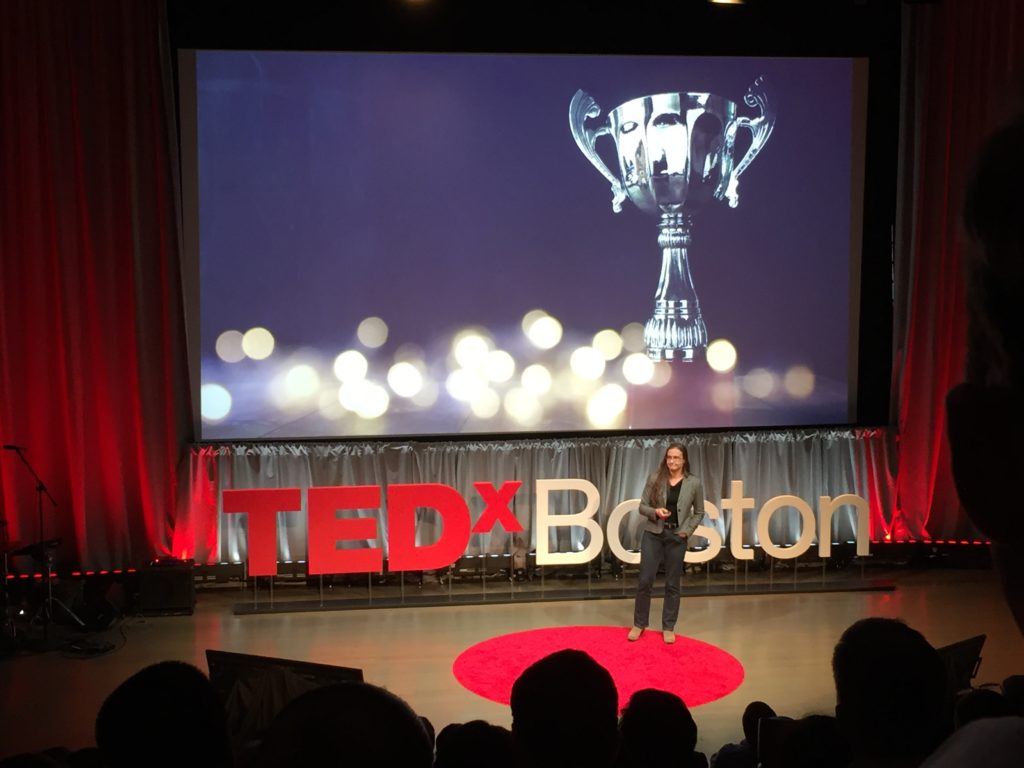By Riley Robinson, news correspondent
This year’s TEDxBoston event at the Institute of Contemporary Art Monday presented artificial intelligence from all angles: algorithmic creations are exploring the oceans, predicting patients’ deaths and even writing screenplays performed by human actors.
The third is a creation by speakers Ross Goodwin, a former political ghostwriter; Oscar Sharp, a writer; and Benjamin, their robot. Goodwin and Sharp began collaborating while enrolled in graduate programs at New York University. They, with the robot, produced a short film, “Sunspring,” in spring of 2016, and screened it at the beginning of the event. The writers admitted the plot was obscure and almost nonexistent: One male lead announced, “I need to see the skull.” The camera then cut to the other character spitting up a googly eye.
“I’ve taught kids — even middle-aged kids — to write screenplays,” Sharp said during the presentation. “But honestly, our little machine was writing it better.”
However, both speakers urged the public not to fear artificial intelligence (AI) intrusion into human creativity.
“I don’t think there’s any reason to be afraid of this,” Goodwin said. “Machines won’t replace writers any more than the piano will replace the pianist.”
AI as friend, not foe, became a common theme as the day continued. Multiple speakers emphasized the human skill needed to direct this new technology. Michael Littman, a computer science professor at Brown University, compared machine learning to raising a child.
“The human trainer is a central component in creating the AI,” he said. “We don’t want our creations to grow up to become racist Twitter bots. We need to teach them well.”
Kenneth Anderson, a professor of law at American University, closed out the first of two sessions with a discussion on the laws of emerging technology. He said ethical questions regarding AI are now realistic concerns.
“Law can only get actual when the technology becomes actual,” he said. “We are at that point now.”
He discouraged two common extreme representations of machine intelligence — that robots will create a utopia or that they will destroy humanity as we know it.
“I think they’re both mistakes,” Anderson said.
Singer-songwriter Shea Rose, a Boston native, then performed between sessions backed by her three-member band. They plunged the audience into a “sound bath,” a wordless mix of keyboard, guitar, digital mixing and Tibetan singing bowl.
“We wanted to give the audience a cleanse from the talks,” Rose said. “So we wanted something more ambient. We call it a digital sound bath.”
Rose is also a former TEDx speaker, having presented at TEDxBeaconStreet in 2014.
The event’s second half largely focused on artificial intelligence’s potential in health care.
Finale Doshi-Velez, an assistant professor of computer science at Harvard, and Ziad Obermeyer, an assistant professor at both Brigham and Women’s Hospital and Harvard Medical School, spoke about using algorithms to predict a patient’s risk of death. As he spoke, he stood underneath a slide that read “Death is easy to diagnose.”
“The same algorithms that predict how much time you’re going to sit in traffic today are also predicting the day you will die,” Obermeyer said. “It’s all just data, and the computer doesn’t really care.”
Obermeyer said better predictions of death can enable better end-of-life care, preventing patients from ending up on life support unwillingly after their symptoms gradually snowball.
“We need to convince hospitals, insurers and especially patients that algorithms are more like penicillin and less like leeches,” he said.
Barbara Engelhardt and Claudia Perlich then each presented about AI in data science. Engelhardt, an assistant computer science professor at Princeton University, uses statistics and algorithms to study human genes. Perlich uses machine learning in advertising for Dstillery in New York City.
Jim Bellingham, the director of the Center for Marine Robotics in Woods Hole, Massachussetts, closed out the event by explaining how society can use AI to explore the bottom of the ocean and the moons of Jupiter.
Some audience members left with a different opinion of AI then when they arrived. Mark Mitchell from New London, New Hampshire, was invited to the event by a friend.
“AI was a fear prior to coming here,” Mitchell said. “But they actually presented it in a way that’s more of a tool than an enemy.”









